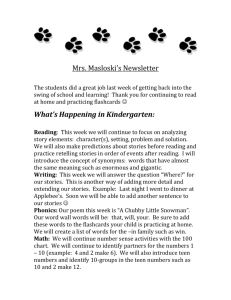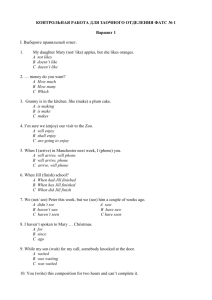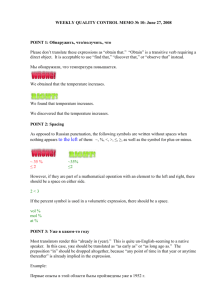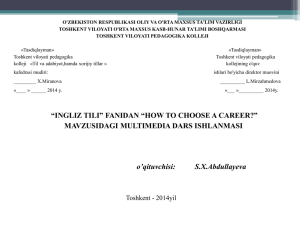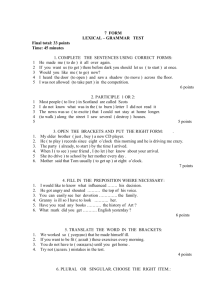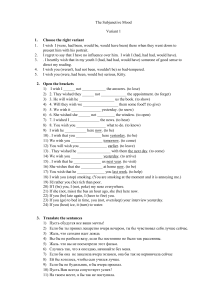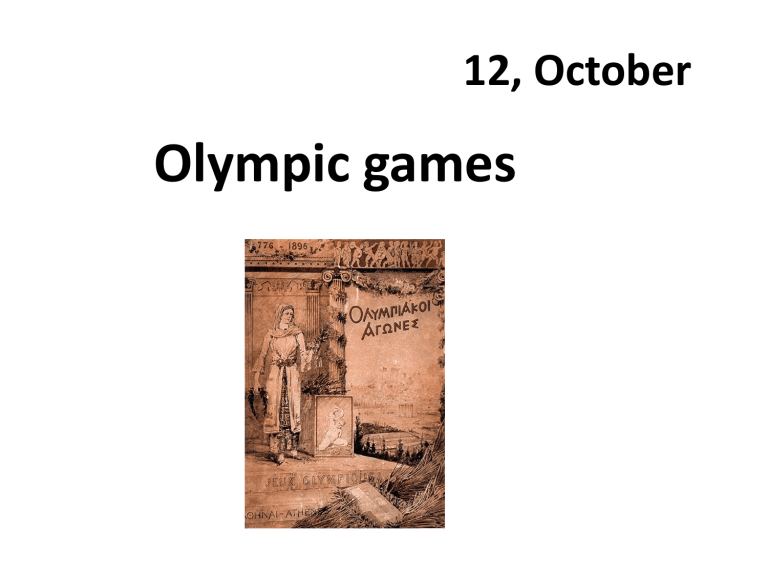
12, October Olympic games competition originally committee change modern twice hold 11, October How to keep the English happy precious behaviour answer to question advice include understand a present Find in the text p. 48-49 Мы помним, что иностранцы не знают нашего поведения, и пока ты дружелюбен и вежлив от всего сердца, мы не думаем, что ты ведешь себя немного странно. Если ты гость в доме британца, мой совет таков: «Спроси, если не знаешь, что делать дальше» Мы обычно кладем на тарелку так много, сколько хотим съесть. Мы можем принести маленький подарок гостю, кто пригласил нас на вечер, но это также позволительно и прийти без подарка, для того, чтобы просто насладиться компанией. A: Мы помним, что иностранцы не знают нашего поведения, и пока ты дружелюбен и вежлив от всего сердца, мы не думаем, что ты ведешь себя немного странно. B: Если ты гость в доме британца, мой совет таков: «Спроси, если не знаешь, что делать дальше» C: Мы обычно кладем на тарелку так много, сколько хотим съесть. D: Мы можем принести маленький подарок гостю, кто пригласил нас на вечер, но это также позволительно и прийти без подарка, для того, чтобы просто насладиться компанией. Конечно, англичане будут более признательны получить от вас поздравительную открытку, нежели нести домой тяжелый подарок. Если ты остаешься у кого-то дома, ты должен быть готов развлечь себя сам в некоторое время. Ваши хозяева будут признательны за помощь по дому – но не все время. D: Конечно, англичане будут более признательны получить от вас поздравительную открытку, нежели нести домой тяжелый подарок. E: Если ты остаешься у кого-то дома, ты должен быть готов развлечь себя сам в некоторое время. E: Ваши хозяева будут признательны за помощь по дому – но не все время. Homework • Карточка Are celebrations important? Do you agree? • Some people think that there are holidays and celebrations that are important, others think that they play a small role in our life. P. 54-55 • What holidays and celebrations do these young people discuss? 1. Nelly Carter 2. Tom Baker 3. Jessica Boyd Vocabulary • • • • • • • • To connect with – Grown-ups – Gift – To afford – Ghosts – To benefit – Charity – To unite – Translate. • • • • • • • • Иностранцы Поведение Дружелюбный Вежливый Гость Тарелка Поздравительная открытка Развлекать Homework. p. 55 – 2) • Prove it from the text. Would you like to write a postcards? Culture note • Very best wishes FOR/ON … • Congratulations on passing the exam! How to write a postcard? • Begin with “Dear, …” • The important information • Best wishes or Love, … P.58 ex. 2 • What do the British wish on different occasions? Homework • Write a postcard Giving and receiving gifts Think and answer the questions • What do you want to receive on New Year? • Do you like to receive gifts? • Do you like to give it? p. 59 ex. 1 • Are you sure • I am hundred per cent sure • Oh, thank you very much! • Thanks a million! Homework • P. 60 ex. 3 Role play Do you like travelling? What are your travel habits? Find in the text in ex. 1, p. 66 • Многие Британцы проводят часть каникул вне дома и многие уезжают за границу. • Как результат, число туристических агентств возрастает. • Некоторые люди однако не любят организовывать отдых, предпочитая отправляться самостоятельно. • Сейчас модно людям брать два отпуска в год. Vocabulary, p. 66 • • • • • • • • • • an agency – an agent – accommodation – an excursion – a guided coach tour – on one’s own – a destination – a resort – a trip – a holidaymaker – Travelling abroad is in fashion nowadays. • I think … - Я думаю … • On the one hand … - С одной стороны, … • On the other hand … - С другой стороны, … • Besides, … - Помимо этого, … Homework • P. 67, ex. 2 What to know before you go? Obligation and necessity • Must – для долженствования обязательства. выражения и You must get a visa. – Вы должны получить визу. Obligation and necessity • Should/ ought to - носят характер совета или рекомендации. • You should read the leaflet. – Вам следует прочитать этот буклет. Obligation and necessity • Need/don’t need to - когда мы говорим об отсутствии необходимости что-то делать. • You don’t need to get a visa. – Вам не нужно получать визу. Translate. • Вы должны купить билет. (to buy a ticket) • Вам следует взять паспорт. • Вам не нужно посещать туристическое агентство. • Вам следует спросить про информацию в вашем туристическом агентстве. • Ты должен надеть ремень безопасности. (to wear a seat belt) Homework • P. 70 ex. 1 - 1) Translate. • Ты должен это сделать! • Вам следует помочь им. • Вам не нужно делать домашнее задание. • Они должны быть вовремя. • Ей следует слушать учителя. • Ему нужно купить молока. Are you an adventurous traveller? Possibility, ability. Выражение возможности, способности. • Когда кто-то имеет возможность или способность что-либо делать, тогда используем COULD, BE ABLE TO. • Для выражения возможности в настоящем – COULD. • We could go for a walk. - Мы могли бы пойти на прогулку. • О фактически совершившемся действии в прошлом или о том, что нам удалось сделать – WAS/WERE ABLE TO. • I was able to get a visa – Мне удалось получить визу. • Когда говорим о возможности что-либо делать в будущем, используем – WILL BE ABLE TO. • I will be able to go to the London next year. – У меня будет возможность поехать в Лондон в следующем году. What ways of travelling do these teenagers are talking about? • P. 73 ex. 1 – 1) Homework • Учить грамматический материал 2ух последних уроков. How long does it take to travel round the world? Translate. • Мы могли бы спеть вместе. • Мне удалось понять этот грамматический материал. • Им следует говорить медленнее. • Ты должен прекратить болтать. • Ей не нужно идти в магазин. • Я не смог посетить тетю. • Мне не удалось встретиться с тобой. • У него будет возможность путешествовать в Европе. Check yourself. • • • • • • • • We could sing together. We were able to understand this grammar. They should talk slowly. You must stop talking. She doesn’t need to go to the shop. I couldn’t visit my aunt. I wasn’t able to meet with you. He will be able to travel in Europe. p. 76 ex. 1 - 1)2) • Read. • “The world is no longer a big place”. How do you understand it? • Do ex. 1 2) in written form. Homework • P. 77 ex. 2 – read correctly. Выразительное и верное чтение. Have you ever travelled to London? “London quiz” Match the words to get the names of the places of interest. 1) Big 2) Trafalgar 3) Tower 4) Buckingham 5) Westminster 6) The Houses of 7) The Tower of 8) The London a) Palace b) London c) Eye d) Ben e) Square f) Abbey g) Parliament h) Bridge Read and match. 1. London is 2. The London Eye is 3. Buckingham Palace is 4. The Tower of London is 5.The Houses of Parliament is 6. Big Ben is 7. Trafalgar Square is 8. Westminster Abbey is a) a big wheel. b) an ancient fortress. c) a place where Queen Elisabeth II lives when she is in London. d) a famous bell. e) an ancient working church. f) the capital of the UK. g) is in the heart of London. h) home of the British Parliament. Закончи текст, заполняя пропуски словами: thousands, was founded, city, of, cathedrals, interesting, famous. • London is the capital of the UK. It is a very old (1)_________. It (2)____ __________ about two thousand years ago. London is one of the most famous and (3) ___________ cities in Europe. It is (4) ___________ for its places of interest. There are lots of museums, historical buildings, ancient (5) ____________ and monuments. It is full (6) ____ history. Every year (7) __________ of tourists come to London. Choose the correct ending • 1. You can see the column with a statue of Nelson in… a) Piccadilly Circus b) Hyde Park c) Trafalgar Square • 2. London Zoo is in … a) Regent’s Park b) St. James’s Park c) Hyde Park Choose the correct ending • 3. Another famous sight inside the Tower of London is the … a) Pelicans b) Ravens c) Ducks • 4. The London home of the Queen is … a) Buckingham Palace b) Westminster Abbey c) Covent Garden Choose the correct ending • 5. The seat of the British Government is ... a) Piccadilly Circus b) Buckingham Palace c) The Houses of Parliament Answer the questions. 1. What is the official name of the country? 2. What is the geographical name of the country? 3. What countries does it consist of? 4. What are their capitals? 5. What is the capital of the UK? 6. When was it founded? 7. How many people live in the capital? Do you feel like travelling? p. 81-82 •Jennifer •Jeremy •Alison What is your favourite travelling destination? p. 87 – Reading • What is Bianca’s destination? favourite
